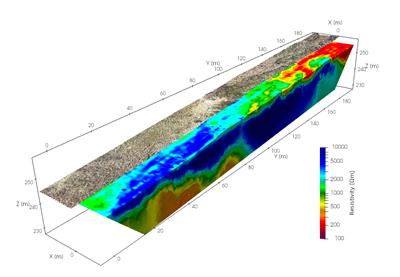All Categories
Featured
Table of Contents
Geophysical Prospecting in Parkwood Aus 2023
Time piece from 23 to 25ns. This last slice is now almost all blank, however a few of the walls are still revealing strongly.
How deep are these slices? Unfortunately, the software I have access to makes approximating the depth a little challenging. If, however, the top three slices represent the ploughsoil, which is most likely about 30cm think, I would guess that each slice is about 10cm and we are only coming down about 80cm in overall.

Thankfully for us, most of the sites we have an interest in lie just below the plough zone, so it'll do! How does this compare to the other methods? Contrast of the Earth Resistance data (leading left), the magnetometry (bottom left), the 1517ns time slice (leading right) and the 1921ns time piece (bottom left).
Geophysical Survey - Durham University in Ardross Aus 2022
Magnetometry, as discussed above, is a passive strategy determining local variations in magnetism versus a localised zero worth. Magnetic vulnerability survey is an active technique: it is a measure of how magnetic a sample of sediment might be in the existence of an electromagnetic field. Just how much soil is tested depends upon the size of the test coil: it can be very little or it can be relatively large.
The sensing unit in this case is very little and samples a tiny sample of soil. The Bartington magnetic susceptibility meter with a large "field coil" in use at Verulamium throughout the course in 2013. Leading soil will be magnetically enhanced compared to subsoils merely due to natural oxidation and reduction.
By measuring magnetic vulnerability at a relatively coarse scale, we can find locations of human profession and middens. We do not have access to a reputable mag sus meter, however Jarrod Burks (who helped teach at the course in 2013) has some excellent examples. One of which is the Wildcat website in Ohio.
Geophysical Surveys - Mining, Exploration And Geoscience in Wembley Aus 2021
These villages are typically set out around a central open location or plaza, such as this reconstructed example at Sunwatch, Dayton, Ohio. Sunwatch Town, Dayton, Ohio (photo: Jarrod Burks). At the Wildcat site, the magnetometer survey had located a range of features and homes. The magnetic susceptibility survey assisted, nevertheless, specify the primary location of profession and midden which surrounded the more open location.
Jarrod Burks' magnetic vulnerability study results from the Wildcat website, Ohio. Red is high, blue is low. The technique is therefore of excellent usage in defining locations of general occupation rather than identifying particular features.
Geophysical surveying is a used branch of geophysics, which uses seismic, gravitational, magnetic, electrical and electromagnetic physical approaches at the Earth's surface area to determine the physical homes of the subsurface - Services Geophysical - Utility Survey Corp. in Bassendean Oz 2021. Geophysical surveying methods usually measure these geophysical properties along with anomalies in order to examine different subsurface conditions such as the existence of groundwater, bedrock, minerals, oil and gas, geothermal resources, spaces and cavities, and much more.
Latest Posts
Geophysical Survey Methods in Champion Aus 2021
Geophysical Survey - Salisbury Archaeology in Hocking Australia 2021
What Can I Do With A Major In Geophysics? in Carine Australia 2023